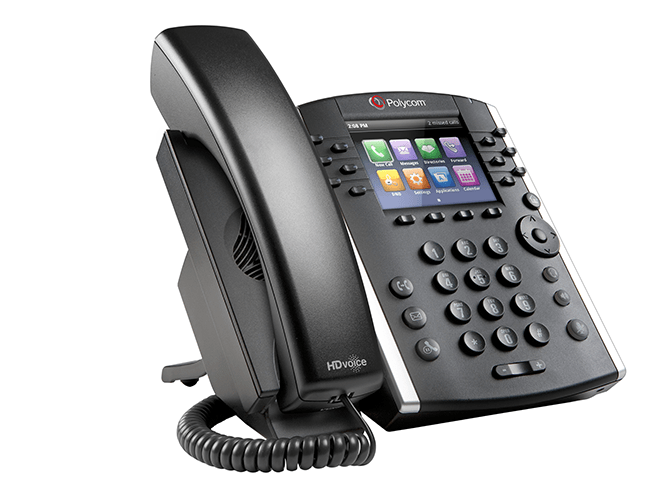If you’re looking into IP telephony for your business, you’ve likely come across the terms ‘hardphone’ and ‘softphone’. VoIP telephone systems use both hardphones and softphones, depending on the requirements of the user. That’s why it’s important to know the difference between the two.
What’s the difference between a hardphone and a softphone? A hardphone is a physical IP phone that plugs into the network. A softphone is is software used on PCs and laptops with full VoIP functionality.
Most businesses use hardphones, but softphones are a cost-effective option and still gives your business the full functionality of your VoIP telephone system. I’m going to compare hardphones and softphones, giving you a good idea of how both work and how your business could use them.
Hardphones: How They Work And Benefits For Your Business
Hardphones typically resemble a traditional telephone and they function in a virtually identical way. Instead of dialling out over traditional telephone lines, however, calls are instead made over the internet.

For the most part, VoIP hardphones will plug directly into your network. While hardphones typically have power supplies, some hardphones are PoE. This means an ethernet cable powers the device, meaning only one cable will be needed to power the phone and connect it to the network.
IP hardphones are more advanced than your average phone and offer greater functionality. They are designed specifically with VoIP telephone systems in mind, so they enable you to make the most of your system.
Now you have a good idea of how hardphones work, I’m going to talk through some of the benefits of these devices.
Greater Reliability
Hardphones are typically more reliable than softphones. Softphones naturally rely on your PC or laptop to function correctly. If your device is running slow or you’re having some other technical issues, you may lose your softphone. If you have a lot of applications open or processes running, this can impact the performance of your softphone.
When you are using hardphones, you have devices dedicated to making and receiving calls. Ultimately, this means you have a more reliable solution. Hardphones don’t have other processes going on in the background, as they are solely used for calls. This will ensure good call quality every time, as performance will not be impacted by anything that you’re doing on your PC.
Not Reliant On A Computer/Laptop
It’s impossible to use a softphone without a computer or laptop, or another device that you can install the software on. With this in mind, you could lose phone system functionality if your computer suddenly stopped working.
As I briefly mentioned before, a hardphone is not reliant on a computer to function. It is a separate device that doesn’t integrate with your computer, so you can use it regardless of how your computer is functioning.
Requires Less Training To Use
Depending on the age and experience of your workforce, moving over to a VoIP telephone system is likely easier if you use hardphones. Hardphones are similar in appearance to traditional desk phones, so your workforce will already know how they function. If you start using softphones after your team have been using traditional phones for many years, there may be a bit of a learning curve and more extensive training needed.
Although softphones work similarly to a standard desk phone, using a piece of software is harder than using a hardphone for those with no training. If you want to integrate your new telephone system as smoothly as possible, hardphones would be the best option.

Softphones: How They Work and Benefits For Your Business
A softphone is software on a computer, laptop or smartphone, among other devices. Any device with a microphone, speakers and internet connection can have the needed software installed on it. The software offers full VoIP telephone system functionality without the need for an actual desk phone.

You can use a softphone anywhere, not just in the office. As long as your device has an internet connection, you will be able to access your softphone and use it to make and receive calls. This makes softphones perfect for businesses that have employees working remotely or don’t operate from a fixed location where a hardphone could be installed.
As with the hardphones, all calls are made over the internet rather than a traditional phone line. As your internet-enabled device is already connected to your network, no extra cabling or hardware will be required to use a softphone.
So, that’s a bit of background on softphones and how they work. Now I’m going to take you through some of the key benefits.
No Extra Hardware Needed
If you choose to use softphones, you don’t require any hardware as long as you have an internet-enabled device with a microphone and speaker. This means your business can be set up quicker and for less upfront investment.
If you are working to a tight budget but need a telephone system with plenty of functionality, a VoIP telephone system combined with softphones is perfect. Softphones still have all the VoIP functionality included, so you don’t miss out on any features.
Quicker Rollout
Getting your team set up on softphones is much quicker than getting them set up on hardphones. Provided your team have suitable internet-enabled devices, it’s as simple as downloading the software onto their devices and configuring it. You don’t need hardphones installed at every desk, with can be time-consuming depending on the size of your team.
Depending on the size of your team and where everyone is based, softphones can be ready to use in hours, rather than days or weeks. Depending on the provider that you choose, configuration can be completed remotely with no need to have an engineer coming to your office. When compared with hardphones, softphone rollout is much quicker.
Ideal For Remote Working
Although it is possible to unplug a hardphone and take it home to plug into your home router, it’s not ideal for businesses with a mobile workforce. If you do have a mobile workforce, softphones will suit you and your team much better.
As a softphone hardware can be installed on any internet-enabled device with a microphone and speaker, remote workers can literally carry their office telephone system with them and have the full functionality available to people using hardphones.
Hardphones v Softphones: Which Is Best For Your Business?
Both hardphones and softphones have distinct benefits that mean they both have a place in business communications. However, which should you choose for your business?
Whether you should choose hardphones or softphones really depends on how your business works. Most businesses using a VoIP telephone system actually utilise both to ensure their teams can work no matter where they are.
If your business has a team that’s always moving from location to location, softphones are likely the best solution. Similarly, if your team are always in the office, hardphones may be a better option due to their superior reliability. The best type of phone for your business really does depend on your circumstances.
I hope you’ve found this blog post useful. Hopefully you have a greater knowledge that you can use to choose the best type of phone for your business. I’d really love to read your thoughts in the comments below, so please leave me a message below.
